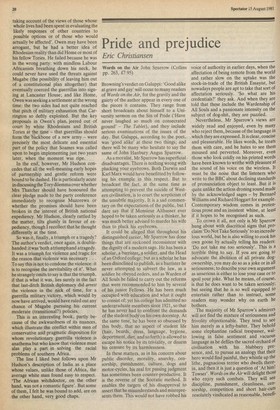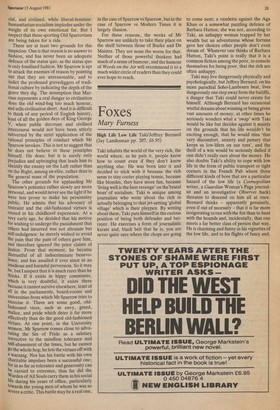Pride and prejudice
Eric Christiansen
Words on the Air John Sparrow (Collins pp. 263, £7.95) Browning's verdict on Galuppi: 'Good alike at grave and gay' will occur to many readers of Words on the Air, for the gravity and the gaiety of the author appear in every one of the pieces it contains. They range from short broadcasts about himself to a University sermon on the Sin of Pride (`Have never laughed so much on consecrated ground' — The Tablet), and they include serious examinations of the issues of the day. But Galuppi, according to the poet, was 'good alike' at these two things; and there will be many who hesitate to say the same of John Hanbury Angus Sparrow.
As a moralist, Mr Sparrow has superficial disadvantages. There is nothing wrong with plucking your eyebrows. Both Darwin and Karl Marx would have benefitted by following his example in this respect. But to broadcast the fact, at the same time as attempting to prevent the suicide of Western civilisation, is to court the scepticism of the unsubtle majority. It is a sad commentary on the expectations of the public, but I dare say that if Monsieur Althusser ever hoped to be taken seriously as a thinker, he was much better advised to murder his wife than to pluck his eyebrows.
It could be alleged that throughout his distinguished career, Mr Sparrow has done things that are reckoned inconsistent with the dignity of a modern sage. He has been a scholar, a barrister, a soldier, and the Head of an Oxford college; but as a scholar he has been disinclined to publish, as a barrister he never attempted to subvert the law, as a soldier he obeyed orders, and as Warden of All Souls he failed to carry out the reforms that were recommended to him by several of his junior Fellows. He has been much occupied with education and what it ought to consist of; yet his college has admitted no undergraduate members since 1921, so that he has never had to confront the demands of the student body on his own doorstep. At the same time, he has been so obsessed by this body, that no aspect of student life (hair, beards, dress, language, hygiene, deportment, diet, and so forth) is allowed to escape his notice by its triviality, or disarm his censure by its harmlessness.
In these matters, as in his concern about public disorder, morality, anarchy, censorship, punishment, culture, dogs and motor-cycles, his zeal for passing judgment has sometimes been counter-productive. It is the reverse of the Socratic method. It enables the targets of his disapproval to assert that he misunderstands and misrepresents them. This would not have robbed his voice of authority in earlier days, when the affectation of being remote from the world and rather slow on the uptake was the stock-in-trade of the British Essayist, but nowadays people are apt to take that sort of affectation seriously. `So what are his credentials?' they ask. And when they are told that these include the Wardenship of All Souls and a passionate intensity on the subject of dog-shit, they are puzzled.
Nevertheless, Mr Sparrow's views are widely read and enjoyed, even by many who reject them, because of the language in which they are expressed. It is clear, concise and pleasurable. He likes words, he treats them with care, and he hates to see them misused and perverted. Moreover, even those who look coldly on his printed words have been known to writhe with pleasure at the sound of his voice on the wireless. It must be the noise that the listeners who write to the BBC about declining standards of pronunciation object to least. But it is quite unlike the artless droning sound made by the acknowledged sages — by Bernard Williams and Richard Hoggart for example. Contemporary wisdom comes in pretentious prose and an insistent whine, at least if it hopes to be recognised as such.
To crown it all, not only is Mr Sparrow hung about with diacritical signs that proclaim 'Do Not Take Seriously' to an incredulous world, but he is also willing to cook his own goose by actually telling his readers: 'Do not take me too seriously'. This is a terrible thing to say. If you are going to advocate the abolition of all private dogownership, you may do so as a joke or in all seriousness; to describe your own argument as unserious is either to lose your case or to spoil your joke. What he means, of course, is that he does want to be taken seriously; but seeing that he is so well equipped to entertain rather than to instruct, some readers may wonder why on earth he bothers.
The majority of Mr Sparrow's admirers will not find the mixture of seriousness and frivolity objectionable. They tend to see him merely as a lefty-baiter. They behold some elephantine radical trespasser, wallowing in false sentiment and vacuous language as he defiles the sacred orchard of civilisation with his blubbery presence, and, to pursue an analogy that their hero would find painful, they whistle up the lithe, pugnacious terrier who dwells therein, and then it is just a question of 'At him! Towser'. Words on the Air will delight those who enjoy such combats. They will see discipline, punishment, cleanliness, censorship, competition and short hair-cutS resolutely vindicated as reasonable, benefl cial, and civilised, while liberal-feministhumanitarian-socialism implodes under the weight of its own emotional fat. But I suspect that these sporting Old Sparrovians are being taken for a ride.
There are at least two grounds for this suspicion. One is that reason is no answer to fashion, and has never been an adequate defence of the status quo, as the status quo is only fossilised fashion. Mr Sparrow is apt to attack the enemies of reason by pointing out that they are unreasonable, and to indict the professed gravediggers of traditional culture by indicating the depth of the grave they dig. The assumption that Marcuse represents a real danger to civilisation does the old wind-bag too much honour, and sells civilisation short. And it is difficult to think of any period of English history, least of all the golden days of King George V, when public decorum and civilised intercourse would not have been utterly subverted by the strict application of the rational principles of conduct which Mr Sparrow invokes. This is not to suggest that he does not believe in these principles himself. He does; but it is surely only Prejudice and upbringing that leads him to Identify the enemy on the Left rather than on the Right, among an elite, rather than in the general mass of the population.
The other grounds for applauding Mr Sparrow's polemics rather slowly are more Personal, and would never see the light if he Were less prone to make his personality Public. He admits that his advocacy of restraint and the old-fashioned virtues is rooted in his childhood experience. At a very early age, he decided that his motive for wishing to undergo the punishment that Others had incurred was not altruism but self-indulgence: he merely wished to avoid the pain that the pain of others gave him, and therefore ignored the prior claims of Justice. From that moment, he became distrustful of all indiscriminate benevolence, and has assailed it ever since as an insidious and harmful perversion. So it may be, but I suspect that it is much rarer than he thinks. If it exists in hippy communes, Which is very doubtful, it exists there because it cannot survive elsewhere, least of all in the parliaments, board-rooms and universities from which Mr Sparrow tries to exorcise it. There are some good, oldfashioned vices, such as envy, greed, malice, and pride which deter it far more effectively than do the good old-fashioned virtues. At one point, in the University sermon, Mr Sparrow comes close to advocating the Sin of Pride as a salutary corrective to the mindless tolerance and self-abasement of the times, but he cannot go the whole hog; he lets the virtues off with a warning. Nor has his battle with his own Charitable impulses been a successful one; for in so far as tolerance and generosity can be carried to extremes, thus far did the Warden of All Souls carry them in his social life during his years of office, particularly towards the young men of whom he was so severe a critic. This battle may be a real one, in the case of Sparrow vs Sparrow, but in the case of Sparrow vs Modern Times it is largely illusion.
For these reasons, the works of Mr Sparrow are unlikely to take their place on the shelf between those of Burke and De Maistre. They are none the worse for that. Neither of those powerful thinkers had much of a sense of humour, and the humour of Words on the Air will recommend it to a much wider circle of readers than they could ever hope to reach.



































 Previous page
Previous page